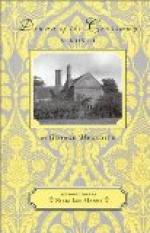‘Oh, a few days. Promise me . . .’
‘Any honourable promise!’
‘You will not keep me waiting longer than the end of the Session?’
‘Probably there will be an appeal to the country.’
‘In any case, promise me: have some compassion.’
’Ah, the compassion! You do not choose your words, Percy, or forget who is the speaker.’
’It is Tony who forgets the time she has kept her lover dangling. Promise, and I will wait.’
‘You hurt my hand, sir.’
‘I could crack the knuckles. Promise!’
‘Come to me to-morrow.’
’To-morrow you are in your armour-triple brass! All creation cries out for now. We are mounted on barbs and you talk of ambling.’
‘Arthur Rhodes might have spoken that.’
‘Rhodes!’ he shook off the name in disgust. ’Pet him as much as you like; don’t . . .’ he was unable to phrase his objection.
She cooled him further with eulogies of the chevaleresque manner of speaking which young Mr. Rhodes could assume; till for very wrath of blood—not jealousy: he had none of any man, with her; and not passion; the little he had was a fitful gust—he punished her coldness by taking what hastily could be gathered.
Her shape was a pained submission; and she thought: Where is the woman who ever knows a man!—as women do think when one of their artifices of evasion with a lover, or the trick of imposingness, has apparently been subduing him. But the pain was less than previously, for she was now mistress of herself, fearing no abysses.
Dacier released her quickly, saying: ’If I come tomorrow, shall I have the promise?’
She answered: ‘Be sure I shall not lie.’
‘Why not let me have it before I go?’
‘My friend, to tell you the truth, you have utterly distracted me.’
‘Forgive me if I did hurt your hand.’
‘The hand? You might strike it off.’
‘I can’t be other than a mortal lover, Tony. There’s the fact.’
’No; the fault is mine when I am degraded. I trust you: there’s the error.’
The trial for Dacier was the sight of her quick-lifting; bosom under the mask of cold language: an attraction and repulsion in union; a delirium to any lover impelled to trample on weak defences. But the evident pain he inflicted moved his pity, which helped to restore his conception of the beauty of her character. She stood so nobly meek. And she was never prudish, only self-respecting. Although the great news he imparted had roused an ardent thirst for holiday and a dash out of harness, and he could hardly check it, he yielded her the lead.
‘Trust me you may,’ he said. ’But you know—we are one. The world has given you to me, me to you. Why should we be asunder? There’s no reason in it.’
She replied: ’But still I wish to burn a little incense in honour of myself, or else I cannot live. It is the truth. You make Death my truer friend, and at this moment I would willingly go out. You would respect me more dead than alive. I could better pardon you too.’




